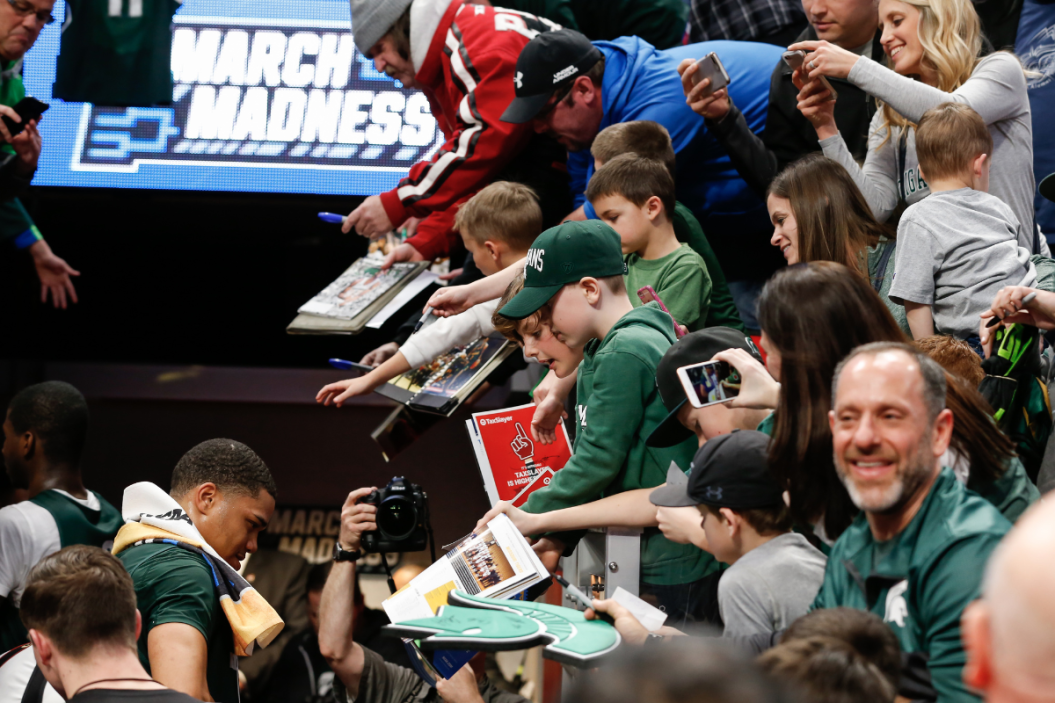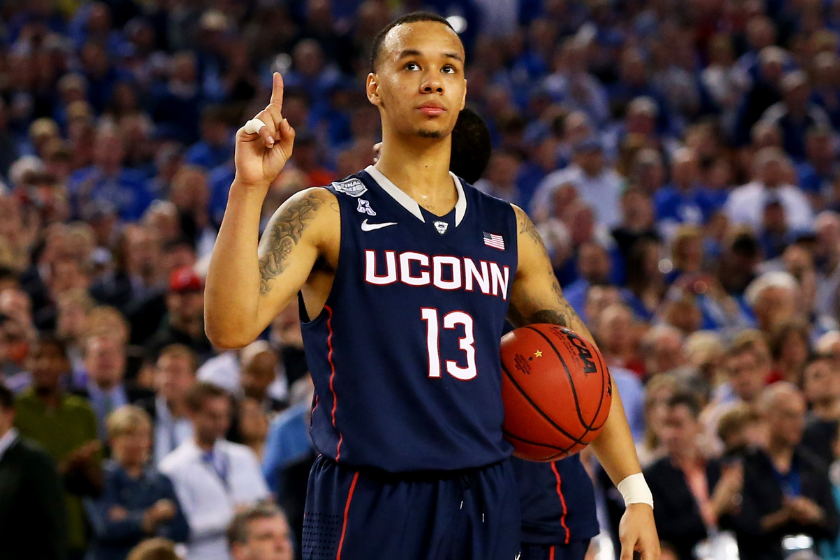College basketball has changed drastically as of late, impacting student-athletes at the Division I level. In the past, players who desperately wanted to hit the road and find another college basketball home were limited. NCAA rules stipulated that if a player was planning to transfer for the first time after a stressful season, they had to sit out the following season unless they obtained a waiver giving them immediate eligibility. As of April 2021, however, college athletes can transfer up, down or at the same level once, without taking a year off.
Videos by FanBuzz
More importantly, the recent NIL ruling completely changed the college sports world and has given players more power than ever. Some of their bank accounts could grow exponentially with NIL money if they play their cards right and land the right endorsement deals at the perfect time.
College football is already battling an almost constant barrage of players leaving Alabama, Ohio State and Oklahoma for other schools like Texas, USC and Florida. On the gridiron, it's the wild west. But we're keeping things on the hardwood today and asking the question: Is this change good for college basketball?
Shabazz Napier Spoke Out On Athlete Compensation in 2014
RELATED: O'Bannon v. NCAA: How One Man Pioneered NIL Deals Into Existence
Last July, the NCAA completely altered the game by allowing student-athletes to start profiting off their name, image and likeness (NIL). If you've been following college basketball for as long as I have, then you should know why student-athletes have been celebrating this decision and the beginning of the NIL Era.
If you recall, Shabazz Napier made headlines in 2014 when he informed the public that he occasionally went to bed starving due to his unfortunate financial situation. That was the moment when the conversation regarding student-athletes getting paid began to heat up nationwide.
The former UConn star averaged 18 points and 4.9 assists per game as a senior while helping the Huskies capture the 2014 NCAA title, but i''s safe to assume there were times when Napier struggled to keep a positive attitude. Sure, the 6-foot guard was balling on the court, but he must have been devastated when he found out the NCAA wasn't concerned about his well-being off the court.
In a CNN article published the day after UConn defeated Kentucky in the national championship game, Napier told reporters that although he experienced hungry nights as a student-athlete, he still had to find a way to play his best basketball for Kevin Ollie and the Huskies. He also added, "When you see your jersey getting sold — it may not have your last name on it — but when you see your jersey getting sold and things like that, you feel like you want something in return."
I don't know how you interpreted Napier's quote, but to me, it's a powerful reminder that student-athletes wanted the NCAA to ensure that they got rewarded for their success/hard work on the hardwood. Was Napier insinuating that they needed to receive huge paydays? Absolutely not, in fact, he stated that he didn't feel that student-athletes "should get hundreds of thousands of dollars", but he did recognize that it was time for them to receive some sort of compensation. The longstanding NCAA definition of "amateurism" had to go.Now, college basketball players can shine on the court and make some good money in the process, which some of them have already taken advantage of, landing some lucrative partnerships during their college careers.
For example, two days before Saint Peter's faced off against Purdue in the Sweet 16, Doug Edert, who netted 20 points against Kentucky and 13 points against Murray State, signed a deal with Buffalo Wild Wings.Before the 2021-22 season even got underway, former Iowa guard Jordan Bohannon inked a deal with Iowa Boomin Fireworks after averaging 10.6 points and 4.4 assists per game the previous year. Oh, and let's not forget about Gonzaga star, Drew Timme, who was able to sign a deal with the Dollar Shave Club (which makes sense) less than a week before the Bulldogs took the floor against Georgia State in the Round of 64 last season. In a way, Shabazz Napier spoke this into existence eight years ago, so I think the UConn legend is deserving of some love in 2022.
NIL Deals Have Created Free Agency in College
RELATED: What's in a Mustache? For Drew Timme, Lots of Moolah
While some players have signed normal NIL deals since last year, others have signed other NIL opportunities that will require them to play at certain schools. Simply put, those players will receive a great deal of cash if they agree to follow straightforward orders from their athletic department.
Think about the deals that Nijel Pack and Oscar Tshiebwe signed this offseason for a second. While Kansas State had a tough season in the Big 12 last year, Pack established himself as one of the best guards in the conference during his sophomore campaign. The Indianapolis, Indiana native built on his success in 2020-21 and poured in 17.4 points per game while shooting 43.6 percent from deep (which ranked 5th nationally). Three weeks after the Wildcats' season ended in the Big 12 Tournament, Pack entered his name into the transfer portal and patiently waited for schools to aggressively pursue him. Less than a month into his recruitment, Pack found himself committing to Miami and accepting an NIL deal that is worth $800,000 over two years and includes a car. Oscar Tshiebwe agreed to return to Lexington after Kentucky failed to reach the Round of 32 last season, and as a result, he will earn $2 million in 2022-23. The SEC Player of the Year averaged 17.4 points and 15.1 rebounds with the Wildcats as a junior.
This all sounds great, right? I mean, everything seems to be going well, so what could possibly be the problem? Well, the problem is that each offseason will feel like a lengthy free agency period moving forward, which isn't good for college basketball in my opinion. Before, it was far more important for players to find the perfect fit during their recruitment process and make the right basketball decision when they felt comfortable doing so.
Nowadays, it's all about who can put the best offer on the table and successfully lure players to their school. You see, money is supposed to be a bonus at the collegiate level (think back to the NIL deals mentioned in the previous section), but unfortunately, I have a feeling that star players with multiple options will prioritize making as much money as possible while playing in college.
Injecting Unchecked Money into College Sports Could Dilute Competition
RELATED: Paige Bueckers is Transcending Her Sport & Making Buckets with NIL Deals
Let me put it to you like this, because some high-profile guys will proudly be able to say that they're making more money than several Division I head coaches, there's a strong possibility they won't remain engaged and put their best foot forward. Add in the fact that players currently don't have to sign performance-specific deals while shopping themselves around, and you'll realize that some of these large NIL/free agency deals could negatively affect how they approach each season. It may be a tough pill to swallow, but as fans, we have to be realistic about where college basketball may be headed in the future. If it's truly all about chasing the big bucks, why would players feel compelled to buy into their team's concept and focus on helping them win as many games as possible? After all, those players probably wouldn't be at those particular schools if the NIL proposals had been unsatisfactory, so it would be asinine to expect them to have a "team first" mindset going into the year.
If schools keep leading with money during their recruiting pitches, it'll become more challenging to spot the main difference between college basketball and the NBA. You'll see more players forgo opportunities to play in systems that could bring them both individual and team success in order to sign the largest deals they can. On the bright side, you'll still get the chance to observe players strike regular deals that won't force them to make any drastic moves in the offseason, which is somewhat encouraging. With that being said, I can't help but fear the version of college basketball that fascinated fans in the past will never return.



